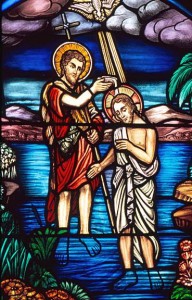 A question asked by many is, “Why did Jesus need to be baptized?” To answer this, let’s first explore the nature of baptism as explained by Saint John Chrysostom.
A question asked by many is, “Why did Jesus need to be baptized?” To answer this, let’s first explore the nature of baptism as explained by Saint John Chrysostom.
Jewish Baptism
There was a Jewish baptism, which cleansed from bodily impurities, but not to remove sins. Thus, whoever committed adultery, or decided on thievery, or who did some other kind of misdeed, it did not free him from guilt. But whoever touched the bones of the dead, whoever tasted food forbidden by the law, whoever approached from contamination, whoever consorted with lepers — that one washed, and until evening was impure, and then cleansed. “Let one wash his body in pure water — it says in the Scriptures, — and he will be unclean until evening, and then he will be clean” (Lev 15:5, 22:4).
Baptism of John
“the baptism of John did not impart the Holy Spirit and it did not grant forgiveness by grace: it gave the commandment to repent, but it was powerless to absolve sins. Wherefore John did also say: “I baptize you with water…That One however will baptize you with the Holy Spirit and with fire” (Mt 3:11). Obviously, he did not baptize with the Spirit.” This is the key aspect of a Christian baptism is that it includes baptism by the Holy Spirit. Paul advised those who had been baptized by John to be baptized again. He said, “John indeed baptized with the baptism of repentance,” — repentance, but not remission of sins; for whom did he baptize? “Having proclaimed to the people, that they should believe in the One coming after him, namely, Christ Jesus. Having heard this, they were baptized in the Name of the Lord Jesus: and Paul laying his hands on them, the Holy Spirit came upon them” (Acts 19:1-6)
Christ’s Baptism
“Then said Paul, John verily baptized with the baptism of repentance, saying unto the people, that they should believe on him which should come after him, that is, on Christ Jesus.” (Acts 19:4)
Saint John writes,
…when all the people thronged out from all the cities to Jordan and remained on the banks of the river, and when He Himself came to be baptized and received the testimony of the Father by a voice from above and by the coming-upon of the Spirit in the form of a dove, then the testimony of John about Him was made beyond all questioning. And since he said: “and I knew Him not” (Jn 1:31), his testimony put forth is trustworthy.
They were kindred after the flesh between themselves “wherefore Elizabeth, thy kinswoman, hath also conceived a son” — said the Angel to Mary about the mother of John (Lk. 1: 36); if however the mothers were relatives, then obviously so also were the children. Thus, since they were kinsmen — in order that it should not seem that John would testify concerning Christ because of kinship, the grace of the Spirit organized it such, that John spent all his early years in the wilderness, so that it should not seem that John had declared his testimony out of friendship or some similar reason. But John, as he was instructed of God, thus also announced about Him, wherein also he did say: “and I knew Him not.” From whence didst thou find out? “He having sent me that sayeth to baptize with water, That One did tell me” What did He tell thee? “Over Him thou shalt see the Spirit descending, like to a dove, and abiding over Him, That One is baptized by the Holy Spirit” (Jn 1:32-33). Dost thou see, that the Holy Spirit did not descend as in a first time then coming down upon Him, but in order to point out that preached by His inspiration — as though by a finger, it pointed Him out to all. For this reason He came to baptism.
When John said: ““I need to be baptized by You, and are You coming to me?” But Jesus answered and said to him, “Permit it to be so now, for thus it is fitting for us to fulfill all righteousness” (Mt 3:14-15). Dost thou see the meekness of the servant? Dost thou see the humility of the Master? What does He mean: “to fulfill every righteousness?” By righteousness is meant the fulfillment of all the commandments, as is said: “both were righteous before God, walking in all the commandments and ordinances of the Lord blameless” (Lk 1:6). Since fulfilling this righteousness was necessary for all people — but no one of them kept it or fulfilled it — Christ came then and fulfilled this righteousness. And what righteousness is there, someone will say, in being baptized? Obedience for a prophet was righteous. As Christ was circumcised, offered sacrifice, kept the sabbath and observed the Jewish feasts, so also He added this remaining thing, that He was obedient to having been baptized by a prophet. It was the will of God then, that all should be baptized — about which listen, as John speaks: “He having sent me to baptize with water” (Jn 1:33); so also Christ: “the publicans and the people do justify God, having been baptized with the baptism of John; the pharisees and the lawyers reject the counsel of God concerning themselves, not having been baptized by him” (Lk 7:29-30). Thus, if obedience to God constitutes righteousness, and God sent John to baptize the nation, then Christ has also fulfilled this along with all the other commandments. (Chrysostom)
